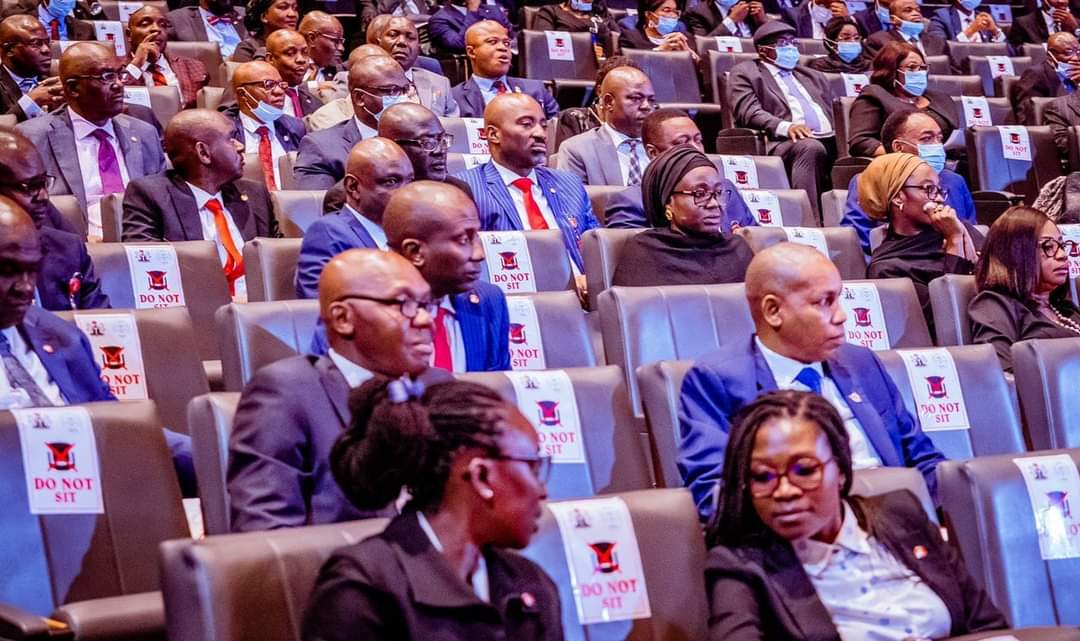Featured
Digital Economy: FG Calls For Stakeholders’ Collaboration

The National Information Technology Development Agency (NITDA) has called for the aggragation of resources together as government, people and institutions to reap the potential benefits of Digital Economy.
Director-General of NITDA, Mr Kashifu Abdullahi, made the appeal in Ilorin, recently, at a Digital Economy sensitisation lecture, titled “Digital Economy: The triple helix model of government, people and institutions”.
The lecture was organised by the Centre for Digital Economy (CDE) of the Kwara State University (KWASU), Malete.
Abdullahi, who was represented by a Director in the agency, Mr Oladejo Olawumi, said the triple helix model is an interaction among these three for the purpose of fostering the economic transformation of various sectors of the economy.
He said the people and industries being the principal vehicle of commercialisation while the government retains its crucial regulatory role.
“Government’s role is therefore critical in the development of the Digital Economy because it must create an environment that is conducive for innovation, investment and growth.
“NITDA has mapped out its 2021 to 2024 Strategic Roadmap and Action Plan (SRAP) with seven pillars.
“The strategy’s implementation will not only ensure the development, usage and sustainability of digital technologies, but will also deepen Nigeria’s economy digitally, diversify the economy, promote innovation and digital literacy, among others.
“On the other hand, tertiary institutions play a critical role in the development of the Digital Economy.
“They are the engines of innovation and provide the knowledge, skills and research necessary for the Digital Economy to grow.
“It is important that they align their activities and curriculum with current societal demands and provide opportunities for students to gain hands-on experience through internships at relevant organisations,” he said.
The NITDA boss added that the government, through organisations like NITDA, can support these institutions by providing infrastructure, grants and regulations that foster capacity development.
“At the same time, it is important to remember that the people are at the heart of the Digital Economy.
“They are the consumers, workers and entrepreneurs driving its growth and the ones who stand to benefit the most from the new opportunities and services it provides.
“It is crucial that the Digital Economy is inclusive and sustainable, benefiting everyone,” Abdullahi said.
He noted that though the Digital Economy presents a wealth of opportunities for growth and innovation, it is important that stakeholders work together as government, institutions and people to ensure that it is inclusive and sustainable for all.
The KWASU Acting Vice Chancellor, Prof. Shaykh Luqman Jimoh, said the CDE was established in February 2022 to be “the Centre for digital innovation thinking, reasoning, harnessing opportunities, resource mobilisation, leadership and value-reorientation for a digital-economy drive in Kwara and Nigeria at large”.
Jimoh said KWASU has been a leader in lifelong education at the tertiary level since its inception as the university provide abundant learning opportunities for the local communities and the region.
Hence, the CDE was established to create avenues for digital education for citizens to tap into the digital economy.
The centre is in collaboration with Ilorin Innovation Hub and is backed by NITDA for Digital Economy training.
The CDE Board Chairman, Prof. Kajogbola Alao, said the CDE was envisioned to take digital economy capacity development to the community and engage the positive digital energy of our youth at all levels.
He expressed optimism that in due course, KWASU would be one of the very best universities in Nigeria to award Bsc in Digital Economy.
Featured
FG To Seize Retirees’ Property Over Unpaid Housing Loans

The Federal Government Staff Housing Loans Board says it has begun the compilation of list of retired civil servants who have defaulted on the full repayment of housing loans obtained.
Head of Information and Public Relations, FGSHLB, Mrs Ngozi Obiechina, disclosed this in a statement in Abuja, yesterday.
Obiechina quoted the Executive Secretary of the Board, Mrs Salamatu Ahmed, as saying that the move was aimed at recovering mortgaged properties from retirees who failed to meet their loan obligations.
Ahmed noted that the decision followed a recent memo issued by Mrs Patience Oyekunle, Permanent Secretary, Career Management Office, Office of the Head of the Civil Service of the Federation.
According to her, the memo reminded public servants of the mandatory requirement to obtain a Certificate of Non-Indebtedness to the FGSHLB and MDA Staff Multipurpose Cooperative Society as a precondition for retirement.
The Executive Secretary said that the board would take necessary legal steps to repossess properties where applicable, in line with the terms of the loan agreements.
She said this was in line with the provisions of the Public Service Rules 021002 (p), issued by the Office of the Head of the Civil Service of the Federation.
“I am directed to bring to your attention the provision of Public Service Rule (PSR) 021002 (p), which mandates all public servants to obtain a Certificate of Non-Indebtedness as a prerequisite for retirement.
“The Federal Government will commence the seizure of mortgaged properties belonging to retiring federal public servants who have failed to fully repay housing loans obtained from the board,” she said.
Ahmed explained that the FGSHLB reserves the legal right to repossess any mortgaged property in cases where a public servant exits service without fully repaying the loan.
She reiterated that the directive also applied to already retired officers who were still indebted.
She urged all affected public servants to regularise their loan status and obtain the required clearance certificate without delay.
“The board is currently compiling a list of such retirees, which will be forwarded to relevant regulatory agencies for debt recovery.
“The FGSHLB remains committed to enforcing compliance and ensuring proper loan recovery procedures are followed, “ she added.
Featured
FG Begins Induction For New Permanent Secretaries, Accountant-General

The Federal Government has kicked off a three-day induction programme for newly appointed Permanent Secretaries and the Accountant-General of the Federation, aimed at equipping them for strategic leadership and effective policy implementation.
The induction, according to a statement yesterday by the Director, Information and Public Relations, Federal Ministry of Information and National Orientation, Eno Olotu, which commenced on Wednesday, is being held at the National Counter Terrorism Centre in Abuja.
Speaking at the opening session, the Head of the Civil Service of the Federation, Mrs. Didi Esther Walson-Jack, congratulated the new appointees and described their roles as pivotal to governance and national development.
“Permanent Secretaries are the engine room of the government. They are critical to driving policy implementation, institutional performance, and reform across the service”, she said.
The Federal Government has kicked off a three-day induction programme for newly appointed Permanent Secretaries and the Accountant-General of the Federation, aimed at equipping them for strategic leadership and effective policy implementation.
The induction, according to a statement yesterday by the Director, Information and Public Relations, Federal Ministry of Information and National Orientation, Eno Olotu, which commenced on Wednesday, is being held at the National Counter Terrorism Centre in Abuja.
Speaking at the opening session, the Head of the Civil Service of the Federation, Mrs. Didi Esther Walson-Jack, congratulated the new appointees and described their roles as pivotal to governance and national development.
“Permanent Secretaries are the engine room of the government. They are critical to driving policy implementation, institutional performance, and reform across the service”, she said.
“The expectations are high, and the responsibility is immense. But with commitment and teamwork, we can deliver a more efficient, accountable, and citizen-centred public service.
“This final lap of FCSSIP 25 calls for urgency, accountability, and strategic focus. You must translate vision into measurable results,” she stated.
In her welcome address, the Permanent Secretary, Career Management Office, Mrs. Fatima Sugra Tabi’a Mahmood, described the programme as a strategic investment in leadership capacity and institutional effectiveness.
The sessions featured expert-led discussions, simulations, and strategic briefings facilitated by a distinguished faculty, including Engr. Suleiman Adamu, former Minister of Water Resources; Dr. Hadiza Bala Usman, Special Adviser to the President on Policy and Coordination; Mrs. Beatrice Jedy-Agba, Solicitor-General of the Federation and Permanent Secretary, Federal Ministry of Justice; Alh. Yusuf Addy, retired Federal Director; Alhaji Bukar Goni Aji, former Head of the Civil Service of the Federation; Amb. Mustapha Lawal Suleiman, Mr. Adesola Olusade, and Dr. Ifeoma Anagbogu, all retired Permanent Secretaries.
Participants include Dr. Obi Emeka Vitalis, Mrs. Fatima Sugra Tabi’a Mahmood, Mr. Danjuma Mohammed Sanusi, Mr. Olusanya Olubunmi, Dr. Keshinro Maryam Ismaila, Dr. Akujobi Chinyere Ijeoma, Dr. Umobong Emanso Okop, Dr. Isokpunwu Christopher Osaruwanmwen, Mrs. Oyekunle N. Patience, Dr. Kalba U. Danjuma, Mr. Nadungu Gagare, Mr. Onwusoro I. Maduka, Dr. Usman Salihu Aminu, Mr. Ogbodo Chinasa Nnam, Mr. Ndiomu Ebiogeh Philip, Dr. Anuma N. Ogbonnaya, Mr. Adeladan Rafiu Olaninre, and Mr. Mukhtar Yawale Muhammed, alongside the Accountant-General of the Federation, Mr. Shamseldeen Babatunde Ogunjimi.
The induction programme will feature sessions on public sector leadership, policy delivery, ethics in service, digital transformation, and performance management.
Featured
NNPCL To Undergo Forensic Audit Soon -FG

The Minister of Finance and Coordinating Minister of the Economy, Wale Edun, has announced that a forensic audit of the Nigerian National Petroleum Company Limited (NNPCL) will begin soon.
Edun revealed this at the ongoing Nigerian Investor Forum, held alongside the IMF/World Bank Spring Meetings in Washington DC.
The minister explained that the recent changes in the NNPCL management are part of a broader effort by the Federal Government to clean up and examine the company closely.
While addressing top global investors, including representatives from J.P. Morgan, Edun shared key reforms the government has introduced to revive the economy and restore investor confidence.
He told the investors that the government’s bold economic steps have laid a strong foundation to attract private investment.
He stated, “Our goal is not just to maintain this momentum, but to accelerate it. We are targeting seven per cent annual growth, and we believe the policies we have implemented have laid the groundwork to achieve this.”
Edun highlighted that President Bola Tinubu’s administration has rolled out major reforms that are already making a difference.
He added that the Nigerian economy grew by 3.84 per cent in the fourth quarter of 2024 and recorded a 3.4 per cent growth for the year.
Edun further stressed the importance of the reforms, describing them as “unprecedented,” adding that, “We said we would do it, and now we have done it. This time, we’re staying the course.”
He pointed out signs of progress such as lower budget deficits, a better trade balance, and a more stable exchange rate.
He also said that the focus is now on growing key sectors, especially agriculture.
According to Edun, agriculture is at the top of the government’s agenda, with the aim of improving food supply and increasing productivity.
“We aim to close the food supply gap, not by importing more, but by enabling domestic producers to scale and innovate,” he said.
On infrastructure, Edun revealed that the government has rolled out 90,000km of fibre optic cable to improve internet access.
He said this move is crucial for supporting young Nigerians and tech startups.
He also noted that 4,000km of roads have been offered for private sector participation, with the first 1,000km already approved for construction.
-
Rivers4 days ago
Army Deactivates 16 Illegal Refineries …Arrests 23 Suspects In N’Delta
-
Social/Kiddies4 days ago
Celebrating Woman As An Icon Of Strength
-
Politics4 days ago
Newly Appointed Bayelsa PDP CTC Chair Unveils Agenda
-
Business4 days ago
Expert Seeks Cooperative-Driven Investments In Agriculture
-

 Politics4 days ago
Politics4 days agoGov Alia Appoints TuFace As Adviser
-
Rivers4 days ago
Man Hacks Reverend Sister To Death In Rivers
-
Editorial4 days ago
Reforming Nigeria’s Prison Crises
-
Politics4 days ago
Leave PDP, Bode George Tells Atiku, Wike





